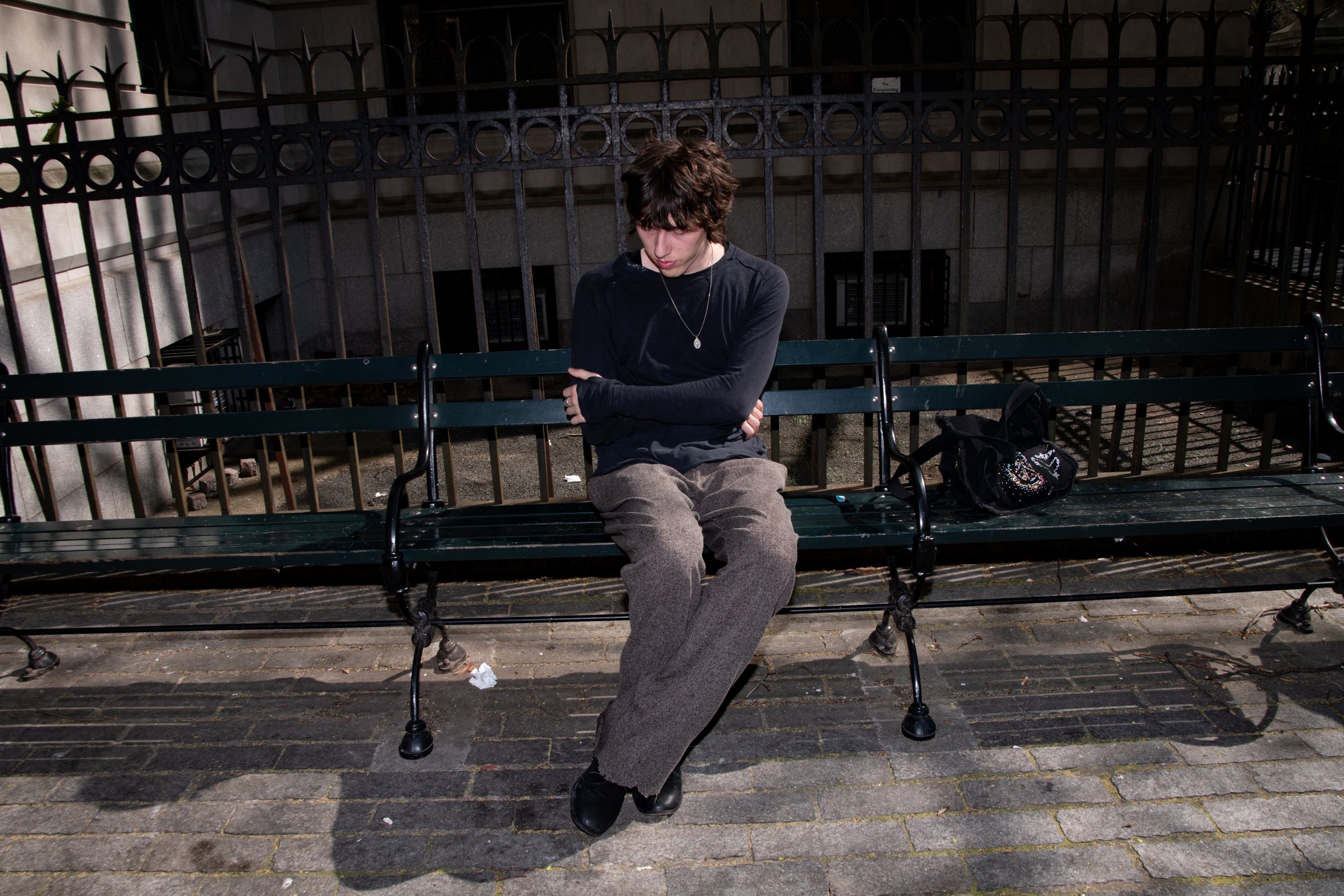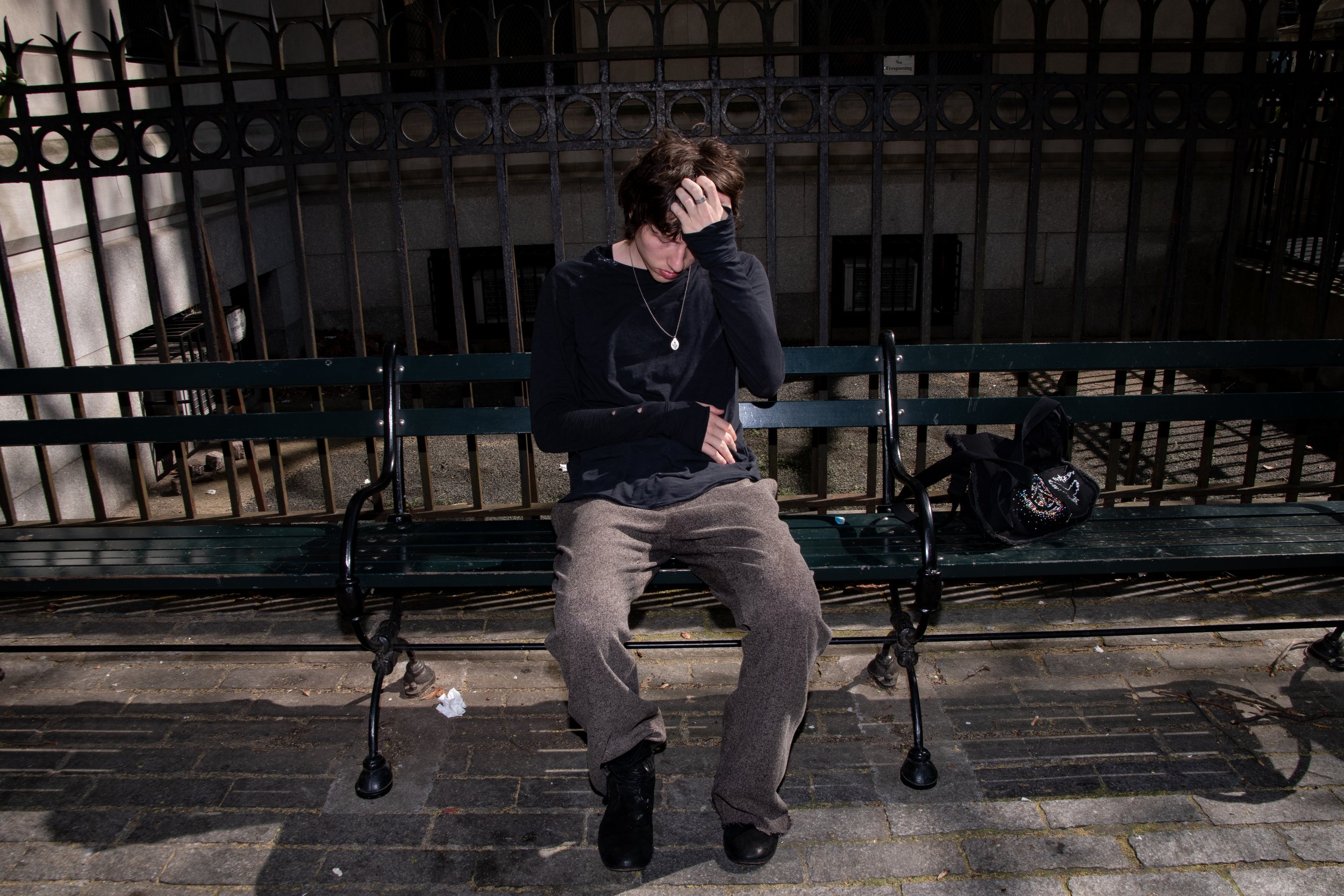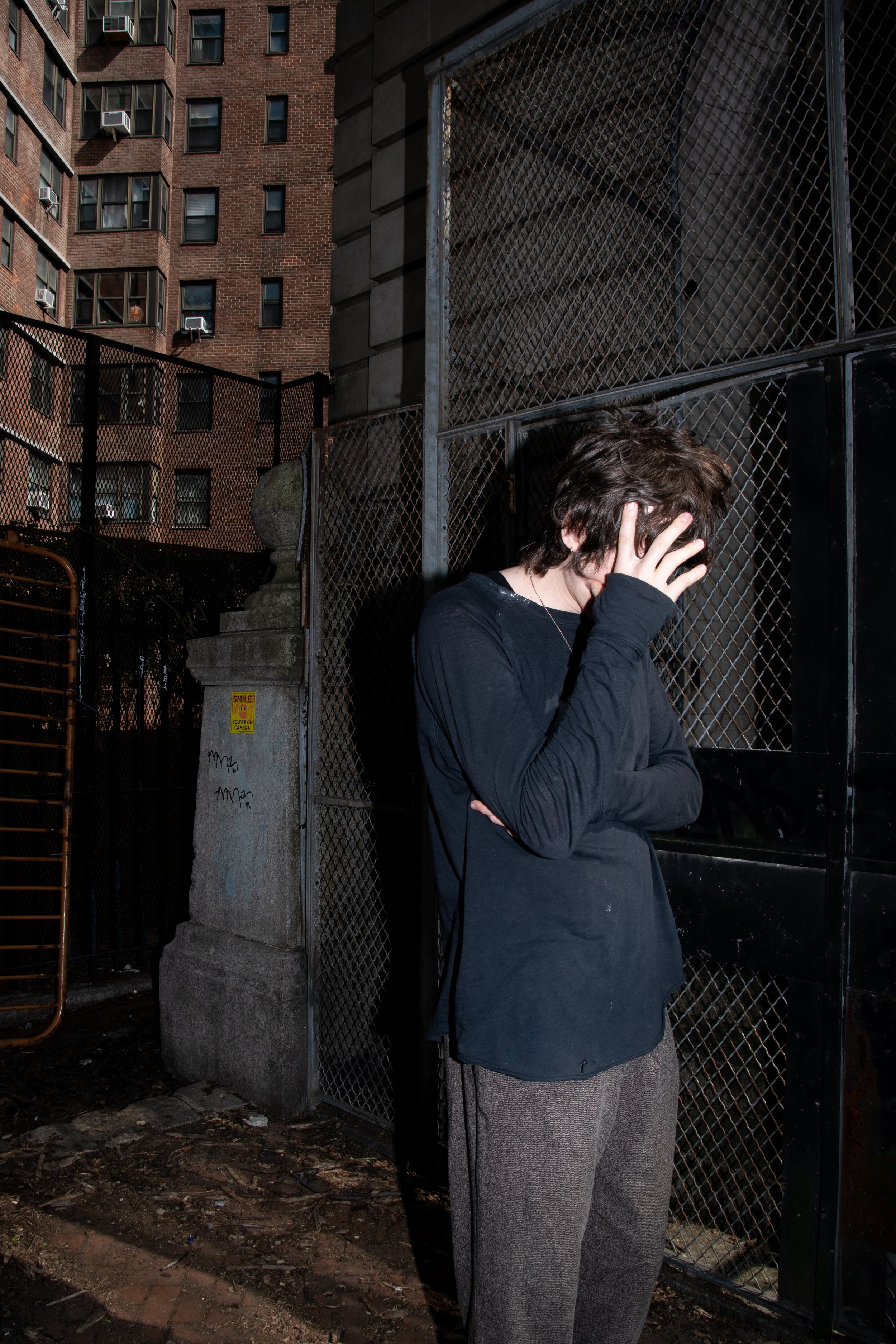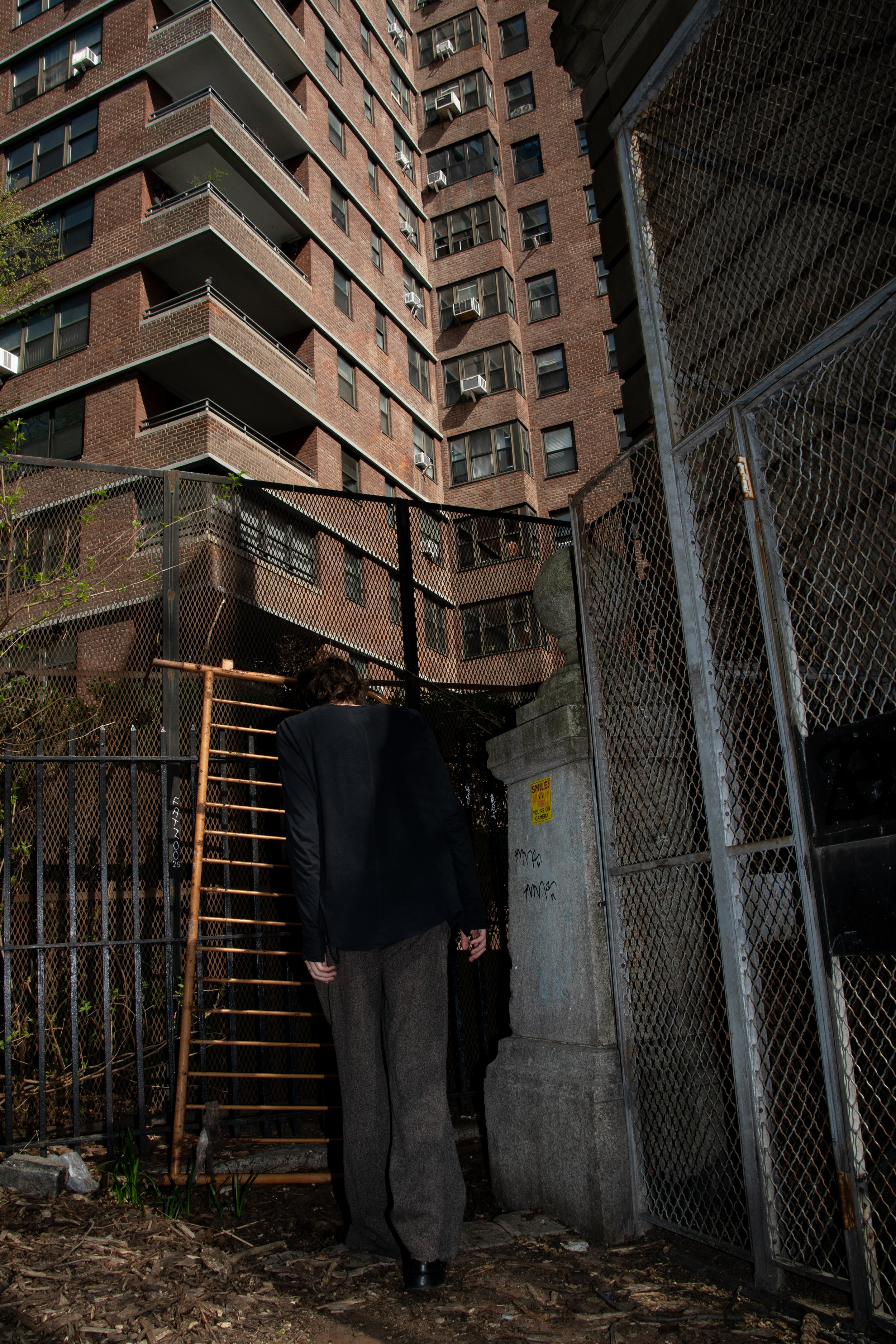AYEGY

Photos by Veronica Alemu for Church Electronic, 4.23.2025













Ayegy’s Parables: GarageBand, the Pacific Northwest, and Jesus
By Katie Li
May 3rd 2025
His comment sections across each of his platforms are flooded with a dominant sentiment: “Ayegy, you are my religion.” This initially sounds like a creative way for fans to emphasize their love for his music, particularly when you take into consideration our generation’s dramatic compliment lingo. However, whether intentionally meant or not, Ayegy’s fans have a point.
Ayegy’s visual accompaniments to his music recontextualize existing religious iconography, creating its own set of idols to pray to. His lyricism suggests a personal set of core beliefs, where freedom is the ultimate blessing (“Release Dove”) and sin must be confessed to the “Witch of Endor.” Defined by the Oxford English Dictionary as "a system of belief and worship, especially [...] directed towards a supernatural,” religion is an appropriate metaphor for Ayegy’s musical world: a microcosm of both himself and the infinity of the spiritual universe.
“Believe it or not, almost all my songs are secretly about Jesus.”
We spoke with underground music’s Jesus or, rather, Jesus’ music at a park in Chinatown and touched on religion, death, rebirth, and everything in between. “I’ve always felt there was something greater,” Ayegy says. “Once you have that realization you can’t really go back. I have no choice but to express that through my music, because it's part of who I am.”
You might know Ayegy from his popular singles “Eternal Return” or “Unifier” with User2222, a remix of Miranda Cosgrove’s song “Disgusting.” You might have stumbled on his Instagram’s cryptic landscape photography, which often includes animals, dead or alive, and/or hints at some vague spiritual presence. Or, perhaps, you know him from his 2022 Boiler Room set, where he Rick Rolls his audience before mixing into a robot narration introducing his personal discography. Each of those parts—music, visual imagery, performance—serves as a vital piece to understanding the expansive artistic world Ayegy has created as an extension of his own spirituality.
With tracks dating back to 2016 still available—a currently rare act of realness in not taking old songs down (maybe they serve as his personal Old Testament)—Ayegy’s vast range of influences are on full display. Spiritually, Norse paganism, Christianity, and Celtic mythology govern his craft. Musically, punk, folk, rap, country and every subgenre of electronic guide his sound. In unison, Ayegy describes the blend best: “I feel like I would call the genre of my music church electronic” (beautifully put… he said it, not me).
2016
2020
2025
His nearly decade-long history of music, video, and visual work documents a dynamic yet consistently personal creative journey. Before his full-fledged conversion to Ayegy-ism (that’s a work in progress, denoting his loose combination of Christianity, paganism, and his rediscovery of Jesus), his early singles’ topics are contrastingly more modern, referencing Wall-E, LMFAO’s “Party Rock,” and rave culture. Sonically, the songs establish the beginnings of his eclectic signature sound; without listening to the lyrics, 2021 single “whatevz” sounds like it could exist within the same consciousness as 2024’s “Bless/Fix”. And while seemingly ideologically different, his early topics do exist as a type of religion for some people. Partying is ritualistic in nature. The world from Wall-E is the ‘heaven’ that today’s ultra-rich seem to be building towards. The songs “GAGA,” “Britney,” and “Miley” reference today’s celebrity culture where their headlines, from their so-called sexual deviance to what they ate for brunch, are analyzed as closely as the Bible’s parables. And, whether subconsciously or not, Ayegy essentially spells it out for us as early as 2020, teasing his future ascent into religion with “I’m a spiritual goon” in “Wall-E.”
Ayegy’s second album, 2022’s Godadelic, is our first true introduction into his theological world, opening with a literal invocation before dropping into an effect-heavy guitar over a jersey kick pattern in "Dig it Up.” Moments later, a layered piano composition tears your heart out. In the next, high-energy vocals sit on the backtrack of a sixteenth note hi-hat pattern, encouraging you to move in a way only possession can explain. Such is the nature of Ayegy’s music—constantly in flux but true to its spirit. The lyrics are often repetitive, as if they’re praying to something, whether it’s in an effort to say it enough times to make it real or maybe just a summoning spell. They’re vague (or, all-encompassing?), sometimes calling to God directly, sometimes calling to an “it,” or sometimes calling to himself. Even in the instrumental track “Prana,” we don’t hear God but we hear God from the way its organ hauntingly reverberates in a way so spacey, only a massive cathedral’s high ceilings could explain those echoes. It’s crucial to listen to the album chronologically to both grasp Ayegy’s journey and go on our own; the appropriately titled intro “Invocation” desperately prays for God to guide ‘him and, just 12 minutes later, his final words conclude “I surrender, I surrender” (“Godadelic”).
These days, Ayegy’s lyricism flows more assuredly, more fully-realized, like a sermon. His most recent 2024 album BLACKTHORN further expands on the themes of death, rebirth, Jesus, and self-discovery that his previous project hinted at. Vague questions are now answered in the phrase that follows: "Do you feel like a criminal when you feel it coming up? It is or it isn’t in the mind of a peasant” (“The Devil Works Hard… But I Work Harder”). Repetition is still ever-present but more elaborate, with each repeat altering the unique, new thought it qualifies. Visually, the album establishes the imagery that guides his worldbuilding. The “Release Dove” music video suggests the vestments of his universe’s religious order—the familiar white cloak albeit more destroyed and physically binding than the traditional Church’s garb. And its settings are nondescript, secluded, and almost always outdoors with the exception of Central Park’s Bethesda Terrace, which is still open-air and staged to look like it’s used solely for religious sermons. If Ayegy’s previous works served as his Old Testament, BLACKTHORN serves as his New Testament.
“Being in a city has influenced my music and made it go more folky and more acoustic. Because I’m thinking about that stuff more now that I’m kind of outside of it ... I think those [feelings of being overwhelmed by the city] are the times where I kind of lean on my creativity more. Try to kind of put myself in other places.”
Every prophet inevitably comes with a backstory that informs their beliefs and process. For Ayegy, those core memories range from his hometown to Lil Wayne to squirrels to divine encounters with strangers. Growing up in the Pacific Northwest, where natural beauty is so accessible, explains the nature symbolism scattered across his work. And, particularly, only when placed in contrast to the New York City landscape Ayegy currently lives in, can we understand why nature is so pervasive in his music; it’s simultaneously an homage, a means of longing, and a form of comfort and escape. He expands more, that his love for the Earth has escalated into “worshipping the Creator of the things on earth,” tracing his music’s otherworldliness to his appreciation of this physical world.
Beyond the connections between God and nature, Ayegy also attributes his music’s theological themes to his personal experiences with religion, which he cites as ever-changing since he was 15. Ironically, Ayegy grew up only “loosely Christian,” allowing him to explore religion(s) without being totally bound to preconceived notions. He cites the cross as one of those teachings he couldn’t fully detach from and we can’t blame him; whether you’ve seen it just once or grown up without religion at all, the cross appears to have monopolized both fashion and the Internet’s moodboards. In his words, “by the Grace of God,” his use of such religious imagery, beginning as somewhat satirical, has become serious and integral to his current works.
“I’ve always had a draw towards certain theology [...] like the cross [...]. But I always told myself it was like, it’s like ironic. That progressed into that veil kind of being lifted and taking it more seriously.”
Paralleling his collection of influences, Ayegy’s artistic process is unconventional. Drawing on the DIY scene he grew up surrounded by, Ayegy works with a limited means, allowing him to remain intimately in control of his craft from his music to their videos and cover arts. Although beginning to collaborate with more people on his work and upgrading recently to Logic, Ayegy emphasizes the finite resources he’s used for his majority of his work—like the free digital audio workstation GarageBand and his bedroom studio setup—has only enhanced his work. We can feel that too; there is a sense of extra personal candor that comes from the DIY, an inexplicable feeling that overproduction and objective sonic ‘perfection’ cannot recreate.
Despite becoming ubiquitous with the serious themes of religion, Ayegy uses religion more loosely as a universal storytelling device, the kind “that can be applied to anyone’s experiences.” His favorite topics of self-discovery, optimism, and death are nowhere near restricted to religion alone. In real life, his statement white cloak was notably absent, opting for a black long sleeve with small holes and signs of wear. And whether or not religious uniforms have simply become more relatable, Ayegy is not trying to start some cult. Instead, he’s simply going against patterns in art he’s noticed hold “no spiritual value”: “I'm just trying my best to make things that I think are more than that, [something that] people can see as more than just like a fun dance track.”
……………………………………………………………………………..
Watch our full conversation with Ayegy below.